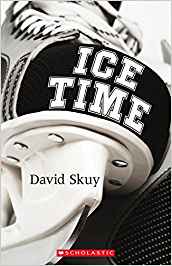| ________________
CM . . .
. Volume XXIII Number 34. . . .May 12, 2017
excerpt:
Ice Time is about Bryan “Rocket” Rockwood, a young hockey player with dreams of playing in the NHL. This is the third book in Skuy’s series about Rocket and follows chronologically from Rocket Blues and Last Shot. In Ice Time, Rocket attends his first NHL training camp, but he is sent down to the AHL to play for the Pinewood Racers and work on his defensive game. Rocket is determined to improve and make it to the NHL, but he is immediately confronted by his old nemesis, Coach Barker, who reappears to bully Rocket as his new coach. When Rocket experiences a concussion, his team’s management pressures him to play injured, and he must decide between his hockey dreams and his health. The reappearance of the conflict with Coach Barker from the first two books of the series seems unbelievable. Skuy seems to be conscious of this, and the characters remark on how hockey is a surprisingly small community, but the conflict continues to feel contrived because of the cartoonish bad-guy quality of the coach’s character. Coach Barker is once again dedicated to making Rocket’s life miserable. The coach is a cruel bully without any significant development. Ice Time breaks with a convention of juvenile fiction in that the intended reader of this book is 9- to 12-years-old, but the protagonist is approximately 20-years-old. This large age gap is the result of the structure of the series wherein each novel has Rocket moving further towards his NHL goal, from AAA hockey to the OHL, and now to the AHL. The characters are supposed to be adults, but their lives are very childlike. Although Rocket is a young professional hockey player with growing star status in the small town, there are no conversations about Rocket’s sexuality or individuals he finds attractive. There is also an absence of alcohol or drugs beyond the brief appearance of a drug dealer that Rocket removes from his apartment building. The language and thought patterns of the adult characters often appear childish in order to be appropriate for the intended readers, with an example being Rocket’s use of phrases like “kissing my butt” when he is upset. While limiting the believability for older teen readers, Rocket’s gentle transition into adulthood will make the novel more accessible for younger readers who may have enjoyed the earlier books. The primary issue of the story is concussions in sports. There is a fairly thoughtful discussion on concussion in sports and the steps people will go to in the hopes of becoming a professional athlete. Rocket’s single-minded determination to become a professional athlete is critiqued in Ice Time. Initially, his friends try to convince Rocket to continue his university education as a back-up plan, but Rocket refuses to admit this possibility. When he begins to suffer concussions, he starts to realize that hard work and determination might not be sufficient to achieve his hockey dreams if he is struggling with injuries. Skuy is careful to present a book that is age appropriate to his young fans, but he seems unable to fully engage with the social issues that strengthened Rocket Blues, in part due to the gap between the character and the child reader. There are some social issues in the story, but they are not explored deeply. For instance, while in Pinewood, Rocket rents a room from a man who was a doctor in El Salvador but who now works as a janitor in North America. There are also small suggestions about prescription drug abuse when Rocket notices how his teammate Rory is always taking pills for his “gimpy” knee, but this topic is never addressed outright. Ice Time focuses on hockey play-by-plays and appeals to young hockey players looking for the “making-it-big-against-the-odds” story. The hockey scenes are full of sports jargon that may be difficult for readers lacking a background in hockey, but this is not necessarily a barrier to enjoying the story. Like Rocket Blues and Last Shot, which were nominated for young readers’ choice awards in several Canadian provinces, Ice Time is sure to find a readership among young hockey fans. Highly Recommended. Beth Wilcox Chng is a teacher-librarian in Prince George, BC. She is a graduate of the Master of Arts in Children’s Literature program at the University of British Columbia.
To comment
on this title or this review, send mail to cm@umanitoba.ca.
Copyright © the Manitoba Library Association. Reproduction for personal
use is permitted only if this copyright notice is maintained. Any
other reproduction is prohibited without permission.
Next Review | Table of Contents For This Issue - May 12, 2017 |
